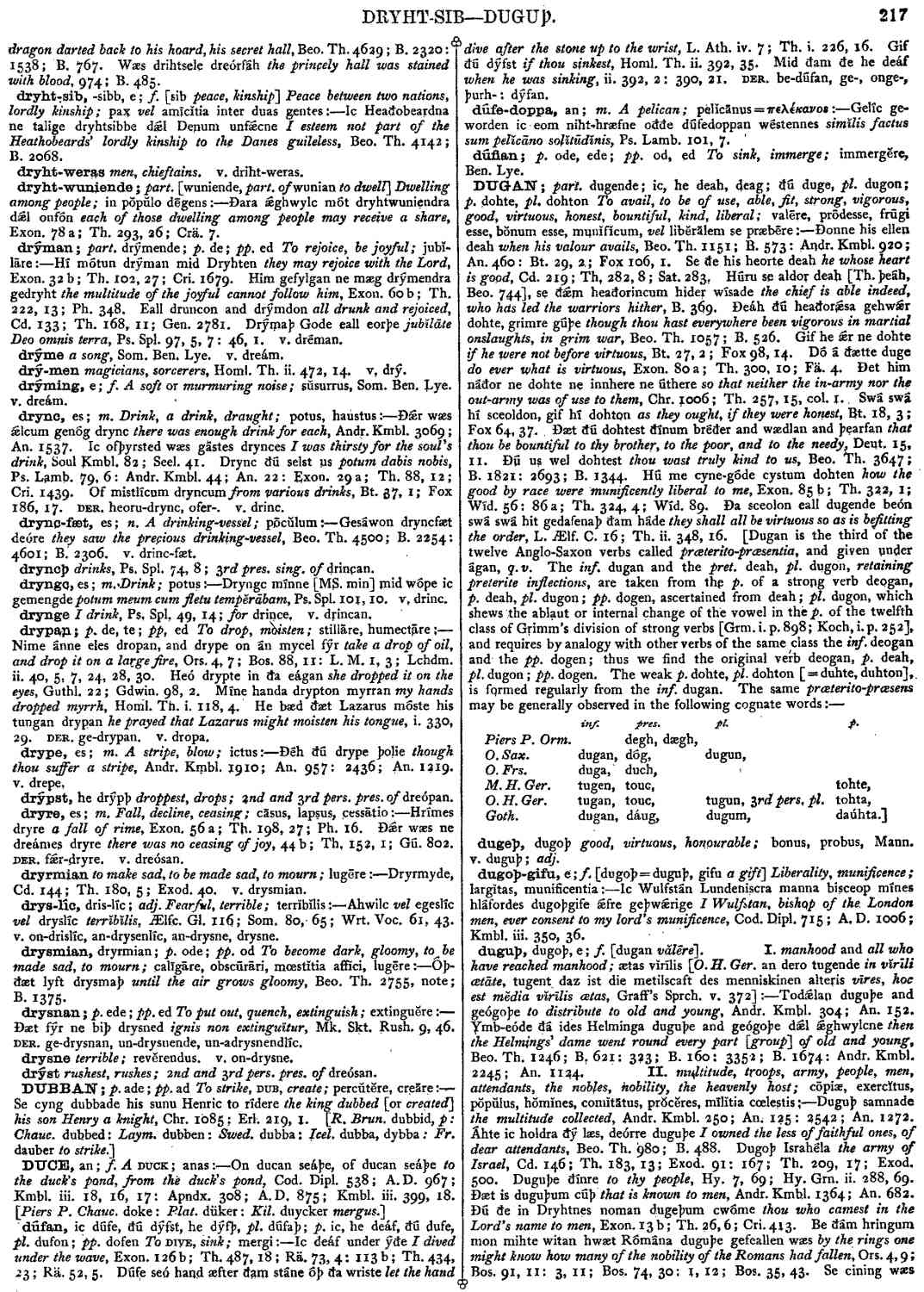duguþ
- noun [ feminine ]
-
Todǽlan duguþe and geógoþe
to distribute to old and young,
- Andr. Kmbl. 304 ;
- An. 152 .
-
Ymb-eóde ðú ides Helminga duguþe and geógoþe dǽl ǽghwylcne
then the Helmings' dame went round every part [group] of old and young,
- Beo. Th. 1246 ;
- B. 621: 323 ;
- B. 160: 3352 ;
- B. 1674: Andr. Kmbl. 2245 ;
- An. 1124 .
-
Duguþ samnade
the multitude collected,
- Andr. Kmbl. 250 ;
- An. 125: 2542 ;
- An. 1272 .
-
Áhte ic holdra ðý læs, deórre duguþe
I owned the less of faithful ones, of dear attendants,
- Beo. Th. 980 ;
- B. 488 .
-
Dugoþ Israhéla
the army of Israel,
- Cd. 146 ;
- Th. 183, 13;
- Exod. 91: 167 ;
- Th. 209, 17;
- Exod. 500 .
-
Duguþe ðínre
to thy people,
- Hy. 7, 69;
- Hy. Grn. ii. 288, 69.
-
Ðæt is duguþum cúþ
that is known to men,
- Andr. Kmhl. 1364 ;
- An. 682 .
-
Ðú ðe in Dryhtnes noman dugeþum cwóme
thou who camest in the Lord's name to men,
- Exon. 13 b ;
- Th. 26 ;
- Cri. 413 .
-
Be ðám hringum mon mihte witan hwæt Romána duguþe gefeallen wæs
by the rings one might know how many of the nobility of the Romans had fallen,
- Ors. 4, 9;
- Bos. 91, 11: 3, 11;
- Bos. 74, 30: 1, 12;
- Bos. 35, 43.
-
Se cining wæsgefullod mid eallum his dugoþe
the king was baptized with all his nobility,
- Chr. 626 ;
- Th. 43, 29: 1016 ;
- Th. 283, 30.
-
He spræc mid duguþe ealdrum
lŏcūtus est cum magistrātĭbus,
- Lk. Bos. 22, 4: 12, 11.
-
Dugoþ Drihten hérigaþ
the heavenly host praises the Lord, Cd. 170; Th. 213, 2; Exod. 546: Exon. 23 b; Th. 65, 32; Cri. 1063. God and Christ are called duguþa helm, dryhten, démend, etc. helmet, lord, ruler, etc. of the hosts or heavenly hosts,
- Cd. 216 ;
- Th. 274, 35;
- Sat. 164: Exon. 19 a ;
- Th. 49, 7;
- Cri. 782: Andr. Kmbl. 173 ;
- An. 87 .
-
Ealra duguþa duguþ, Drihten Hǽlend
majesty of all majesties, Lord Saviour,
- Hy. 3, 24;
- Hy. Grn. ii. 282, 24.
-
He sóhte Drihtnes duguþe
he sought [entered into] the Lord's glory,
- Cd. 60 ;
- Th. 73, 15;
- Gen. 1205 .
-
Wuldre benémed, duguþum bedéled
bereft of glory, deprived of power,
- Cd. 215 ;
- Th. 272, 19;
- Sat. 122: 212 ;
- Th. 263, 21;
- Dan. 765: Exon,16 a ;
- Th. 35, 24;
- Cri. 563 .
-
Seó duguþ ðæs wlítes ðe on gimmum biþ
the excellence of the beauty, which is in gems,
- Bt. 13 ;
- Fox 40, 3.
-
On ðǽm is swiotol sió gifu and ealla ða duguþa hiora fæder
in whom is manifest the ability and all the virtues of their father,
- 10 ;
- Fox 28, 32.
-
Simmachus seó duguþ ealles moncynnes
Symmachus the ornament of all mankind,
- 10 ;
- Fox 28, 12.
-
Hwæt ðú us to duguþum gedón wille
what thou wilt do to our advantage,
- Andr. Kmbl. 683 ;
- An. 342 .
-
Adrifen from duguþum
driven from good,
- Cd. 106 ;
- Th. 140, 5;
- Gen. 2323 .
-
Gifa ðe him to duguþe Drihten scyrede
the gifts which the Lord had bestowed on him for his happiness,
- 176 ;
- Th. 221, 12;
- Dan. 87 .
-
He him duguþa blǽd forgeaf
he gave them abundance of prosperity,
- 121 ;
- Th. 156, 2;
- Gen. 2582 .
-
On ðære dægtíde duguþe wǽron
there were riches at that time,
- 80 ;
- Th. l00, 5;
- Gen. 1659 .
-
Eallum bidǽled duguþum and dreámum
deprived of all blessings and joys,
- Exon. 28 b ;
- Th. 86, 16;
- Cri. 1409: Cd. 43 ;
- Th. 57, 18;
- Gen. 930 .
-
Secgan Drihtne þoncduguþa gehwylcre
to say thanks to the Lord for all benefits,
- Exon. 16 b ;
- Th. 38, 4;
- Cri. 601: 96 a ;
- Th. 359, 3;
- Pa. 57: Cd. 74 ;
- Th. 91, 10;
- Gen. 1510 .
-
He cúðe duguþe þeáw
he knew the usage of decorum [decorous usage],
- Beo. Th. 724 ;
- B. 359: 6330 ;
- B. 3175 .
-
Æfter dugeþum
according to seemliness,
- Cd. 104 ;
- Th. 137, 31;
- Gen. 2282 .
Bosworth, Joseph. “duguþ.” In An Anglo-Saxon Dictionary Online, edited by Thomas Northcote Toller, Christ Sean, and Ondřej Tichy. Prague: Faculty of Arts, Charles University, 2014. https://bosworthtoller.com/8095.
Checked: 1